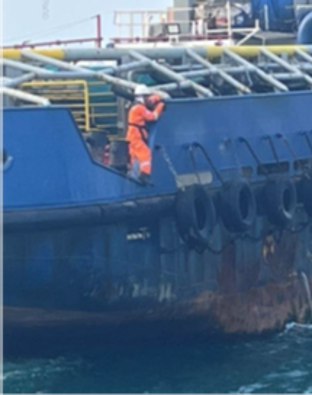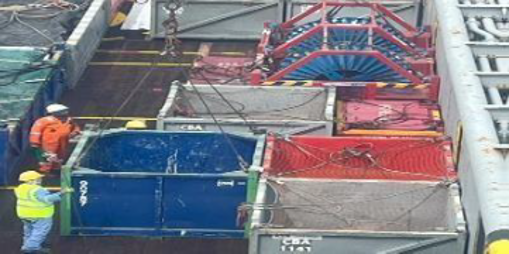Stay in the right place – the importance of personal positioning
- Safety Flash
- Published on 17 November 2025
- Generated on 21 February 2026
- IMCA SF 21/25
- 3 minute read
Jump to:
A member reports two dissimilar events, both of which highlight the importance of ensuring you are not in the wrong place. Where you are standing, how you position yourself, is important.
What happened?
1) Unsafe positioning during berthing
On a vessel approaching the jetty for berthing, crew took their positions for mooring operations. While the vessel was approximately 3m from the jetty, an AB at the stern stepped out to the very edge of the main deck near the bitts to get a clearer view of the distance between the vessel and the jetty, and putting himself at risk of falling overboard between the vessel and the quay.

How did it happen?
- The crew had no clear visibility of what was happening, and one of them put himself at risk to get a better view.
- There was no barrier to prevent crew members standing at the edge of the deck.
- The crew member may not have realised the full risks involved in standing at the deck’s edge while the vessel was in motion.
What lessons can we learn?
- People will sometimes put themselves at risk in order to do a good job.
- Take the time to think things through – putting yourself at risk to get the job done, solves nothing. Is there a better way in this case to get the visibility needed?
- A clear chain of command and effective communication can reduce the need for individual crew members to take unnecessary risks.
- Is there a way to allow better visibility of what is happening during mooring? How can we make it easy to do things safely?
- Barriers help to mitigate risks.
2) Suspended loads
During lifting operations alongside, a near miss occurred when rigging crew from the port and a vessel crew member, were observed physically pushing a suspended load to its intended location. This was a violation of company safe lifting practices and significantly increased the risk of impact injuries or collisions due to unintended load swings, sudden movements, or equipment failure.
Lifting crew should stay clear of suspended or moving cargo during lifting operations. Our member makes available safe hand tools onboard to facilitate “hands-free” lifting.

How did it happen?
- Crew felt that standing very close to suspended loads and pushing them, was the easiest and quickest way to get the job done. They did not recognise or acknowledge the dangers of their positioning, the potential impact from moving load and the failure to use the proper equipment.
- There was no clear deck policy – the area was cluttered, with potential trip hazards and limited escape routes.
What lessons can we learn?
- Keep back! Maintain a safe distance: Stay alert, stay back, stay clear of suspended loads and ensure crew positioning is outside the impact zone.
- Ensure the deck is clear and tidy – a Clear Deck Policy: Ensure the lifting area is free of obstructions.
- Stop Work Authority: Don’t just carry on – if conditions are unsafe, if escape routes are blocked, if loads are being moved in a hazardous way, be ready to stop the job.
Related Safety Flashes
-
IMCA SF 17/22
14 July 2022
-
IMCA SF 16/20
22 May 2020
-
-
IMCA SF 18/13
20 December 2013
IMCA Safety Flashes summarise key safety matters and incidents, allowing lessons to be more easily learnt for the benefit of the entire offshore industry.
The effectiveness of the IMCA Safety Flash system depends on the industry sharing information and so avoiding repeat incidents. Incidents are classified according to IOGP's Life Saving Rules.
All information is anonymised or sanitised, as appropriate, and warnings for graphic content included where possible.
IMCA makes every effort to ensure both the accuracy and reliability of the information shared, but is not be liable for any guidance and/or recommendation and/or statement herein contained.
The information contained in this document does not fulfil or replace any individual's or Member's legal, regulatory or other duties or obligations in respect of their operations. Individuals and Members remain solely responsible for the safe, lawful and proper conduct of their operations.
Share your safety incidents with IMCA online. Sign-up to receive Safety Flashes straight to your email.